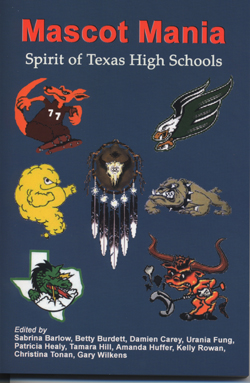Grad Students Do Book on High School Mascots
 Some things are just so Texas we never question them--rodeos, cowboy hats, and high school football. Some things are just so Texas we never question them--rodeos, cowboy hats, and high school football.
But what if you dug a little deeper? What if you knew more about that institution that occupies our Friday nights and our water cooler chatter? What about the mascots?
"It's mystical. It's a religion, almost," said Paul Ruffin, who provided his graduate level editing and publishing class at Sam Houston State University with a prompt about mascots that resulted in a book, "Mascot Mania."
The book discusses the history of many high school mascots, but also has an index of each high school and its mascot. It also has a section about the controversy that arises over using mascots that may no longer be politically correct.
Whether the team is known as the Indians, the Braves, or the Rebels, many schools have been asked to change their name, sometimes in court.
Mascot Mania has humorous and touching stories about how mascots got their names, like the Progreso High School Mighty Red Ants. A much-loved middle school teacher used to call her students together after assemblies and recesses by asking, "Where are my little red ants?"
Her students honored her by choosing as their high school mascot a Mighty Red Ant, despite the reaction the name provokes from rival teams.
The Porcupines, of Springtown High School, discovered that being prickly isn't the only reason rivals should fear this unusual mascot: in the 1960's, the head cheerleader was placed in charge of a real, live porcupine, but "Porky" had a stench that was scarier than his quills!
Some of the names are just puzzling, like the RoHawks, or the Wampus Cats. Or, what is Yegua? A Hockadaisy?
Well, the Randolph RoHawks wanted a name that would reflect the area's occupation with flight. The nearby Air Force base uses a falcon as its symbol, and Randolph High wanted something similar. They wanted something like, "Rocket Hawk" but that didn't sound right. So, they shortened it to "RoHawk."
If you're looking for a Wampus Cat, you'd better start in the little town of Itasca. But different people will tell you different stories about how the football team there got that name.
According to the Itasca High School newspaper, during a pep rally, someone yelled out that one of the football players was a Wampus cat--a ferocious player. And the name stuck.
But others say the Wampus Cat comes from Cherokee Indian folklore. Some even insist the half-man, half-wildcat creature has been spotted in Georgia and Tennessee. The San Antonio Express-News simply calls the creature "a fierce animal that does not exist other than in the hearts and minds of the people in the town of Itasca."
The story behind the Hockadaisy is also confusing. The school crest has a unicorn, but the students at Hockaday High School are known as Hockadaisies. The idea of a "killer daisy" may not instill fear in the hearts of millions, but the school has one other claim to fame: the Bush twins call it their alma mater.
Yegua is a Spanish word that means female horse, but a creek near Somerville High School is also known as the Yegua. The local teams are known as the Yeguas, and, perhaps somewhat redundantly, the Lady Yeguas.
Other names seem sort of, well, obvious, but they inspired an entire section of Mascot Mania. "What Else Would They Be Called?" is dedicated to the Mesquite Skeeters, the Wolfe City Wolves, the White Deer High School Bucks, and the Fighting Farmers of Farmersville. The editors do wonder, though, why are there Hornets in Athens, when Spartans might have made more sense?
Speaking of Hornets, there are 22 Hornet mascots in Texas, including Huntsville. 81 Bulldogs abound from Abilene to Zephyr. There are 15 bears, 10 bearcats and 3 bearkats. Some mascots that are unique in the entire state are the Fighting Sandcrabs, the Raccoons, the Sandies, the Zebras, and the Troopers.
Urania Fung was one of the 10 editors who worked on the book. She said the hardest part of the assignment was finding people who knew about the history of the schools.
"You'd sometimes get somebody who didn't know, but then they'd get interested," she said. "People would start doing research of their own, because the topic was so interesting."
Fung said the class talked to a variety of people to get the information they needed. "[We worked with] school librarians, public relations people, coaches, counselors, and the school Web site. Once, we talked to someone who didn't work there any more. She had retired.
"We were envisioning school libraries [having the book] because we were figuring you'd like to know the history of your school mascot, or your rival's mascot," she said.
"Mascot Mania" is available on Amazon.com, Barnes and Noble's web site, the Texas A&M University Press Consortium and the Texas Review Press Website. The book starts at $10 on Amazon.com.
—END—
Text by Kelly Jakubowski
SHSU Media Contact: Frank Krystyniak
Nov. 14, 2005
Please send comments, corrections, news tips to Today@Sam.edu.
|


